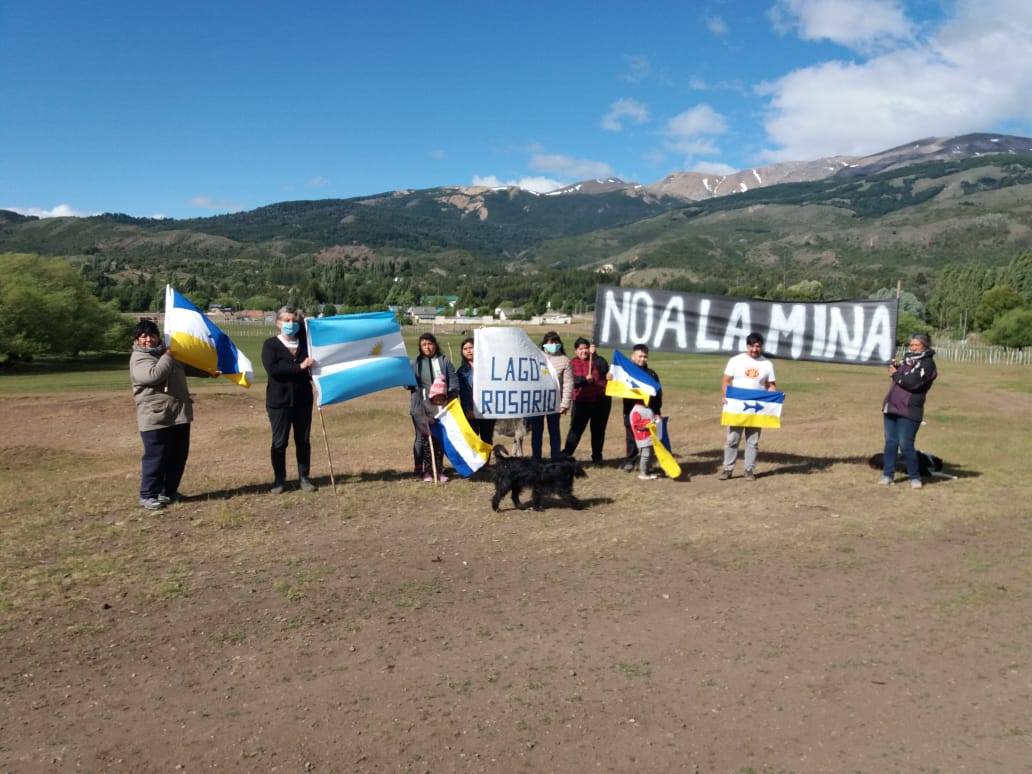On November 24th, 2020, the Provincial Legislature of Chubut, Argentina initiated debate on two important laws for the future of mining in the province. In an online session, both the Popular Initiative to protect the region’s water supplies from mining and the pro-mining “Zoning” bill were sent to commission on the same day, to be analyzed and brought back, with recommendations, to the legislature.
The Popular Initiative (the second of its kind) against mega-mining in Chubut was presented by the Union of Assemblies of the Communities of Chubut (UACCH in Spanish) in October 2020 and is the product of over two decades of struggle to protect the province’s delicate hydrological system against industrial mining. The campaign to develop and ratify the initiative demonstrates the depth and dedication of the Assemblies and the Indigeonus Mapuche-Tehuelche communities of Chubut to protect their water. The Popular Initiative is backed by over 30,000 signatures from the 48 communities in the province. This expression of unity against industrial mining is all the more compelling as the signatures were collected during a difficult combination of factors: the COVID-19 pandemic and the Patagonian winter.
The second bill is the controversial "Sustainable Mining Development in the Province of Chubut"bill (N° 128/2020) (popularly refered to as the "Zoning bill") which seeks to modify the historic Law XVII-Nº 68 (popularly known as 5001), which prohibits industrial mining in the province. The modification would create a “mining zone” where industrial mining could occur. This zone also happens to fall within the Indigenous Mapuche Tehuelche people’s ancestral territories, known as the Meseta – communities that have seen their livelihoods and culture threatened and damaged by mining exploration activities.
Not only is the zoning bill seen as going against the popular will of the people of Chubut, but it is seen by those who will be directly affected by any mining project in the Meseta as being in direct violation of ILO Convention 169 on the Rights of Indigenous and Tribal Peoples and the UN Declaration of the Rights of Indigenous Peoples. Leaders of the Mapuche Tehuelche communities of the Meseta wrote an open letter to the legislative commission demanding that it not accept the zoning bill since it is in direct violation of their rights as Indigeonus peoples to Free, Prior and Informed Consent. They note that “in advancing the analysis and possible approval and ratification of the aforementioned bill you will be flagrantly violating our rights as Indigenous communities.”
The recent decision to send the zoning bill to a legislative commission for review has been heavily criticised as going against the popular will of the people of Chubut, but also as illegal. The zoning bill was not made public prior to its introduction, whereas the UACCH made their Popular Initiative transparent and open to the public during every stage of its conception and socialization. Now, there is evidence to suggest that some politicians connected to the mining industry falsified research findings by CONICET (The National Council for Scientific and Technical Investigations of Argentina) in order to favour the zoning bill. On November 30th, Attorney General Jorge Luis Miquelarena submitted a request to the president of the provincial legislature requesting that the bill be made public in order to corroborate – or not – the need to pursue criminal charges. These revelations, along with the overall sense of betrayal of the over two decades of struggle and the over 30,000 signatories of the Popular Initiative, has both the UACCH and the Mapuche Tehuelche communities demanding the zoning bill be thrown out.
In light of the threat represented by the zoning bill, expressions of strength and unity rang out across the province this past week. There were marches and mobilizations in several Indigenous communities of the Meseta (Gan Gan, Sierra Colorada, Gastre, Yala Laubat, Paso de Indios y Lago Rosario, and others) as well as huge demonstrations in Rawson, Puerto Madryn, Trelew, and Esquel, where marchers shouted “Yes to Life, No to Mining” and “The Meseta isn’t a sacrifice zone!” These protests are just the most recent in a long trajectory of taking over the streets and public space to say ‘NO’ to mining that has marked the province for nearly two decades.
The Commission has only a few days left to review both bills, after which it will decide whether or not to debate them and send a recommendation to the general legislature to make a final decision about the fate of mining in the province. The legislature’s final day of operation is December 10th.
Father Tono, a priest from the Meseta who spoke to journalists at a march in Trelew on Monday, noted that the legislature shouldn’t think twice about the decision at hand:
“The government should withdraw the Mining Zoning Bill, but they won’t have the strength or the humility since they are too convinced and too bought to do what they really need to do...They have been bought by the power of President Fernandez and by Pan American Silver’s money. This is unjust because the struggle is very unequal.”
If successful, this bill would benefit Canadian mining companies Pan American Silver and Yamana Gold’s projects in the province, but it would also mark a signal for other potential investors. In the case of Pan American Silver, the company was condemned just a year ago for lobbying parliamentarians to vote in favour of the zoning, and has been reporting on the necessity to reform the legislation in order to move its Navidad project, currently suspended due to the law and widespread opposition, into development.
Despite the ban, Pan American continues to promote the project in corporate presentations, suggesting that it is still in its ‘portfolio’ and thus subject to investment and speculation. The company also completed an update to its draft baseline and impact studies during the ban. In September Pan American was harshly criticized for requesting a licence for industrial water use for the Navidad project. Despite having suspended mine development in 2012, the company continues to spend money on “community activities” and care and maintenance. Between 2013 and 2019, the company spent $30 million, spending $6 million alone in 2019 (the most it has spent since 2015, see graph attached). It is important to note that there isn´t any more information about how that money was spent. When reviewing the ESTMA (Extractive Secor Transparency Measures Act) report for 2019, the company only reports on cash transfers that went to the National government in the form of royalties and taxes, and money that went to the province of Santa Cruz for its Manatiel Espejo mine. There is nothing about Chubut.
MiningWatch will be watching the legislature closely over the next few days. We support the over 30,000 citizens of Chubut who have raised their voice for nearly two decades to protect their water from mining. Canadian mining companies beware: the future for mining in Chubut is bleak.

